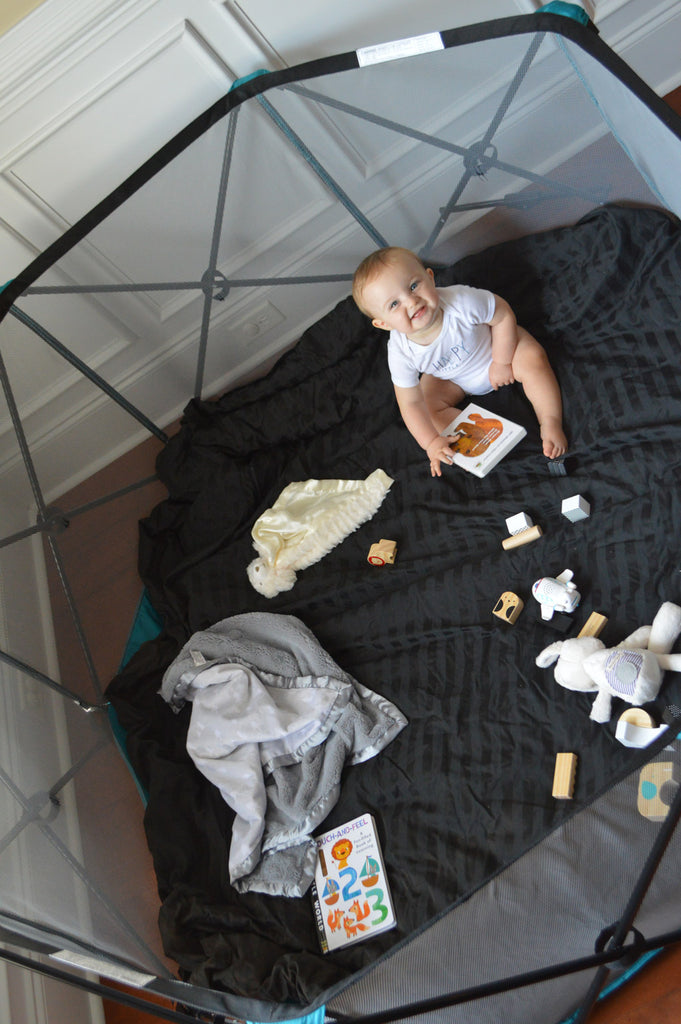
How to Encourage Independent Play in Children
October 30, 2020
Author: Regalo Baby
You may feel overwhelmed and behind on your other tasks when your child is constantly depending on you. Teaching your child to play independently is part of building the confidence he needs to grow. It will also give you space to accomplish your day-to-day tasks.
It is natural to want to spend time with your child—interacting with your child is how you build a bond. However, don’t feel bad about scheduling time throughout the day when your child can play independently.

How Long Should my Child Play Independently?
The amount of time your child independently plays will vary depending on age. Once a child is able to sit up unassisted, he can play in a gated area or play yard for approximately 10 to 15 minutes twice a day. Gradually, this time can be increased.
By the time he is crawling, he should be able to play independently for 30 to 45 minutes. Around one year of age, or slightly older, playing independently for an hour or more will be completely attainable!

How to Teach Independent Play
You know independent play is important, but you may not be sure how to get started. The average toddler requires a parent's attention every four minutes! Here are a few tips to guide you to.
1. Be out of sight, but stay nearby
Provide a safe environment where you can keep an eye on your child without being seen. This might mean putting him in a safe area in the living room while you are multitasking in a nearby room. You can easily stop what you are doing to check on your child. Children may be less likely to require your attention if they don't see you.
2. Rotate the toy box
Make sure he has a few toys to play with. Introducing new toys is a good solution to keep your child from getting bored with toys. Switch out the toy box every month or so to keep the toys interesting.
3. Keep the toys simple
It also helps to keep the toys simple. Electronic devices or toys that do all the entertaining aren’t necessary. Simple activities and toys help build imagination and creativity. Small babies are just beginning to explore the world and may be content with textured fabric and things that make noise like a bell or a rattle.
As your child ages, he may enjoy building things with blocks or boxes. Dolls, figurines, and cars are also great to play with as he gets older.
4. Set a timer
Try setting a timer to help maintain an association with the timer noise and transitioning to another activity. Soon the timer will be indication that independent playtime is done and you are on to your next fun activity. When it's time to move on to the next activity, the transition will be easier!Allow Your Child to Lead the Play Time When you play with your child, take turns leading the play. As long as he is in no danger of hurting himself or damaging anything, there is no reason to interfere. On the contrary, if you always take charge of playtime, your child will grow accustomed to passively playing and depend on others to show him how to play.

Planning for Transitions
It’s a good idea to cue your child about upcoming transitions. When it is time to switch activities or when you need to interrupt him, perhaps for a diaper change, find an appropriate stopping point. You might watch him for some sign that his attention has flagged or when he stops what he is doing to look at you (this is similar to waiting for another person’s conversation to pause so that you can interject something).
You can introduce the transition by saying, “It is nearly time for lunch. Finish what you are doing, please.” Or you might give an allotted time, “You have five minutes and then it will be time for lunch.” This is a less jarring way to transition to a new activity than to just pull him out of what he is doing.

Ways to Bond With Your Baby Other Than Play
Playtime is not the only opportunity you have to bond with your child. Giving him your undivided attention while he is eating or taking a bath can allow the two of you to bond. When you offer your undivided attention regularly (but not necessarily constantly), your child will be more confident about playing on his own during independent play time.
Independent play is important for children and parents. It gives developing babies the opportunity to explore the world on their own and to develop their imaginations. And thankfully, it also gives you the chance to take care of other responsibilities rather than having to provide your child with continuous entertainment. Best of all, independent play can help to foster confidence and self-sufficiency, which are skills your children will be able to use for a lifetime!
Featured Image: Instagram @dustedwithglitter
